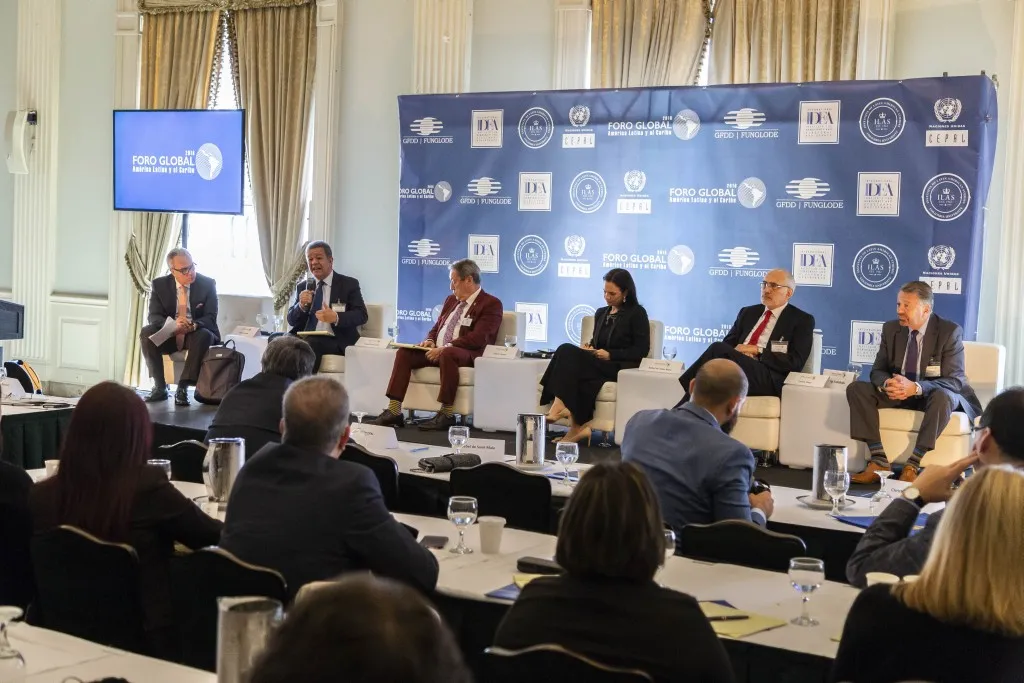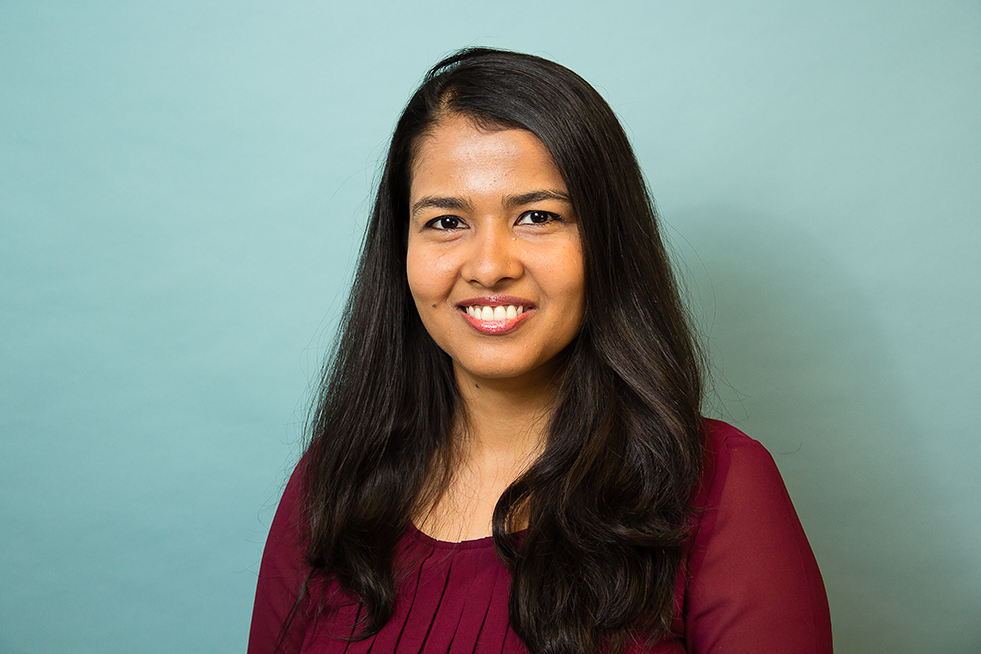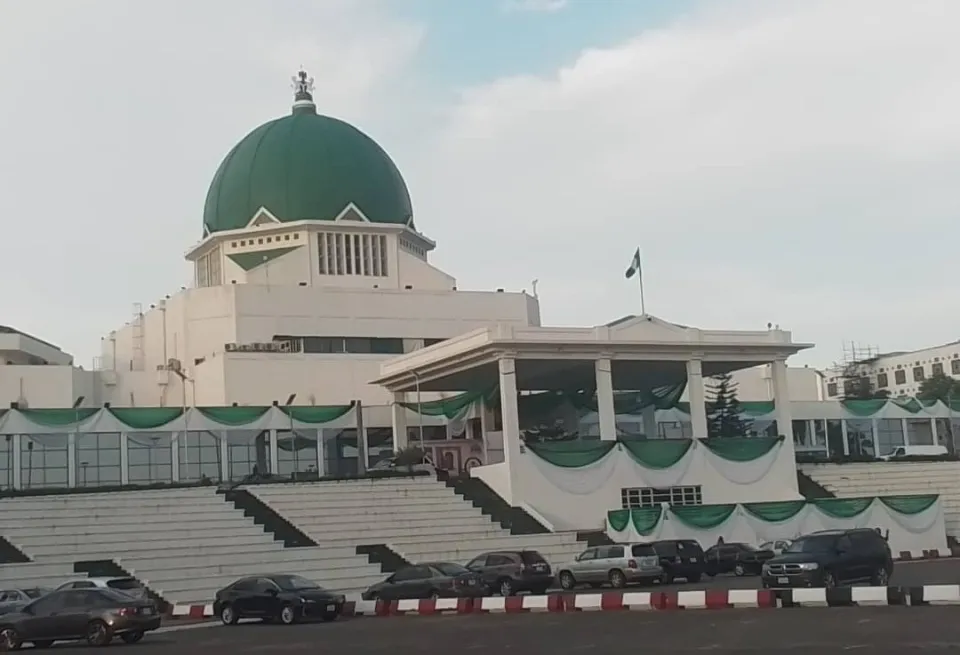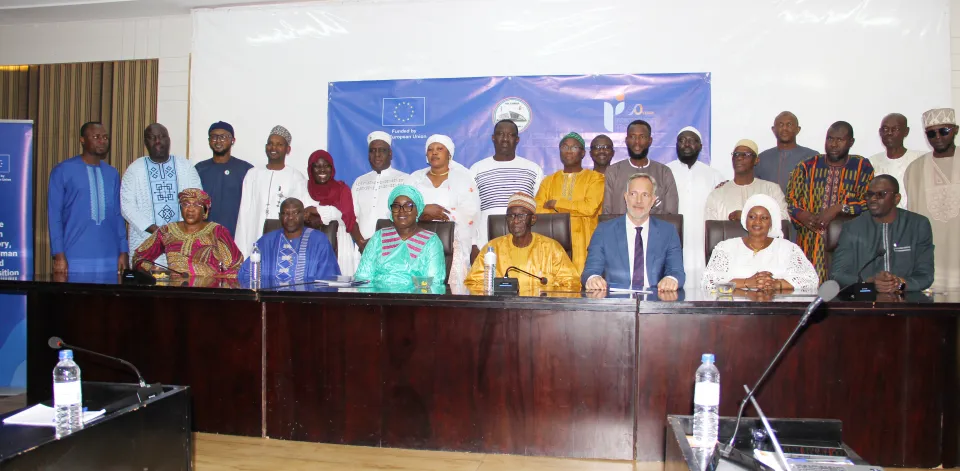First Annual Global Forum on Latin America and the Caribbean 2018

The first Global Forum on Latin America and the Caribbean was held in the margins of the High-Level Segment of the 73rd Session of the United Nations General Assembly in New York from 25-27 September 2018. The Global Forum brought together the region´s top experts and leaders, including former Heads of State and government representatives as well as senior representatives from regional organizations, universities and think tanks to discuss and analyze the role of Latin America and the Caribbean on the world stage. The forum was co-organized by the International Institute for Democracy and Electoral Assistance (International IDEA), together with Fundación Global Democracia y Desarrollo (FUNGLODE) and its sister institution in the United States, the Global Foundation for Democracy and Development (GFDD), the Institute for Latin America Studies at Columbia University and the Economic Commission for Latin America and the Caribbean (ECLAC).
Este artículo se encuentra disponible en Castellano.
During the kick-off event on the evening of Tuesday, 25 September2018, Yves Leterme, Secretary-General of International IDEA gave an opening remark which highlighted the work of the institute and the importance of such forums to promote regional dialogue among different stakeholders. Leonel Fernandez, former president of Dominican Republic and currently the President of FUNGLODE stressed the need to continue working to strengthen democracy in the region, while highlighting the role of his country in the democratic consolidation in the region.
On Wednesday, 26 September 2018, during the first panel on “Socioeconomic Perspectives of Latin America and the Caribbean”, Alicia Bárcena, Executive Secretary of ECLAC delivered a keynote presentation highlighting the financial situation in the region, including several macroeconomic concerns. Her address was followed by a panel discussion between Daniel Titelman, Director of Economic Development Division of ECLAC, Francisco Rodríguez, Chief Economist at Torino Capital, and Humberto López, Director for Strategy and Operations at the World Bank. The panel was moderated by Luis Manuel Piantini, Ambassador and Permanent Representative of the Dominican Republic to the WTC, UNCTAD, ITU and WIPO. During the second panel on “Global Economic Outlook,” Dawn Holland, Chief of the Global Economic Monitoring Branch of the Development Policy and Analysis Division at the United Nations made a keynote presentation on the current global economic scenario. This was followed by a panel, moderated by Mario Báez, Chief of Policy and Oversight Coordination Service at the United Nations and including interventions by Robert Wood, Principal Economist at the Economist Intelligence Unit (EIU) and Adam Posen, President at the Peterson Institute for International Economics.
During the third panel, Daniel Zovatto, regional director for Latin America and the Caribbean gave a keynote presentation titled “Electoral Super Cycle 2018,” in which he highlighted that the apparent drop in the quality of democracy in the region is marked by the impact of high-profile corruption scandals, and the issue of insecurity, elements that negatively impact the political, social and economic landscape. He also explained that recent professional surveys carried out have determined an important drop in the credibility of the institutions that are the mainstay of democracy, a situation that he considers worrisome. In order to put a stop to the weakening of the quality of democracy in the region, Zovatto recommended the need for the region’s leaders to place greater emphasis in the execution of policies that will create more quality jobs, combat inequality and put an end to corruption and impunity.
His presentation was followed by a panel discussion on the regional super-electoral cycle between María Victoria Murillo, Professor of Political Science and International Public Relations at Columbia University, Mónica Pachón, Dean of the Universidad del Rosario in Bogotá, Gerardo de Icaza, Alternate Secretary for the Strengthening of Democracy of the Organization of American States (OAS) and Marcela Berland, President of Latin Insights. The panel was moderated by José C. Moya, Director of the Institute of Latin American Studies at Columbia University.
The first day was concluded with a keynote presentation from Leonel Fernandez, during the fourth panel on “Latin America and the Caribbean on the World Stage”, where he demonstrated how the region’s current political situation is tied to the 2008 financial crisis. He encouraged the creation of a consultation mechanism to coordinate policies related to the region at the international level. His presentation was followed by a panel discussion between Miguel Vargas, Minister of Foreign Affairs of Dominican Republic, Shannon O´Neil, Senior Fellow for Latin American Studies at the Council on Foreign Relations, and Thomas A. Shannon, former Ambassador and Under Secretary of State for Political Affairs, United States. The panel was moderated by Iván C. Rebolledo, co-founder and Managing Partner at TerraNova Strategic Partners.
On Thursday, 27 September 2018, the focus of the fifth panel was the value of democratic and regional instruments to ensure the promotion of democracy. A panel of experts, including Luis Almagro, Secretary General of the OAS, Yves Leterme, Secretary-General of International IDEA, Thomas Garrett, Secretary General of Community of Democracies, and Christopher Sabatini, Adjunct Professor of International and Public Affairs at Columbia University, touched upon issues regarding the current regional integration institutions in Latin America and the Caribbean in a conversation entitled “Value of the International and Regional Democratic Instruments to Guarantee Sustainable Democracies”. The panel was moderated by Massimo Tommasoli, Permanent Observer for International IDEA to the United Nations in New York.
The two-day event was concluded with a sixth panel on “Perspectives on Democracy in Latin America and the Caribbean”, during which the Secretary General Almagro gave special remarks wherein he encouraged regional leaders to work with enthusiasm and determination towards strengthening of democracy in the region. The OAS Secretary General also stated that the Latin American and Caribbean regions are experiencing a setback when it comes to the implementation of the democratic system, with the introduction of authoritarian governments that bring with its weak legal foundations. He then shared the stage with a high-level panel featuring Leonel Fernández; Vinicio Cerezo, former President of Guatemala and Carlos Mesa, former President of Bolivia. Also participating was Isabel de Saint Malo de Alvarado, the Vice President of Panama and Jorge Castañeda, former Mexican Foreign Minister. During the panel, which was moderated by Daniel Zovatto, the group of leaders discussed challenges to democracy and the region’s human rights crises.
Relevant information related to the forum including the programme, panelists, news and documents can be found on the forum website here.




